The Football League was finally resumed on Saturday, August 31st 1946. United's first match was against Grimsby at "home" at Maine Road - a 2-1 win with goals from Rowley and Mitten. The Reds turned out in new kits which I believe were made by local sportswear manufacturers, Umbro. The style of shirts - with stiff white collars and two-buttoned white plackets - are now more commonly associated with rugby, but they would be worn by United players for the next decade. The players wore various different styles of socks throughout the season, possibly due to clothes rationing rules which would stay in force until 1949. The club had appealed to supporters to donate clothing ration coupons during the immediate post-war era, so they had obviously struggled to outfit all of their teams with sufficient kit.
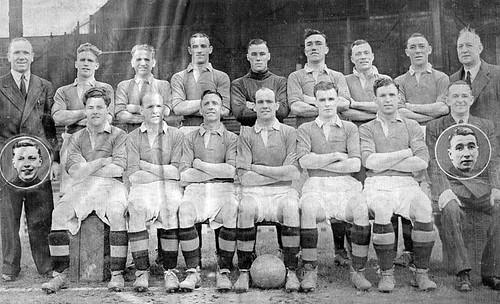
This is an edited version of an image from the extensive Leslie Millman collection, which can be found at www.flickr.com/photos/manchesterunitedman1/ and is used with full permission.
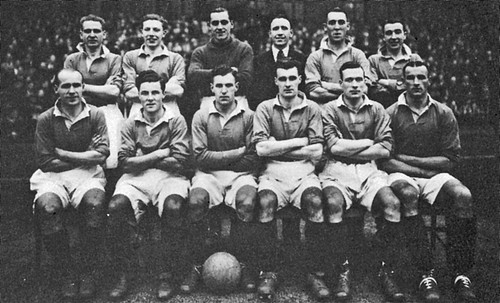
This is an edited version of an image from the extensive Leslie Millman collection, which can be found at www.flickr.com/photos/manchesterunitedman1/ and is used with full permission.
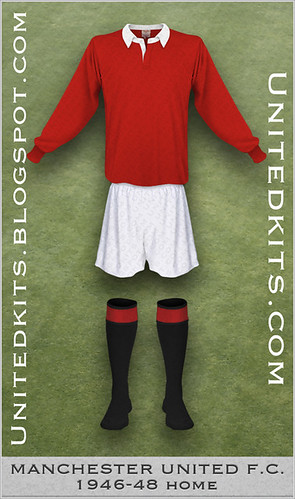
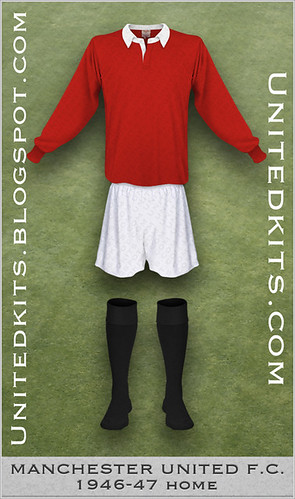
A pre-season friendly match between "red" and "blue" United sides combined with photographic evidence tells us that the club used blue change strips during this time. Besides the colour, they were identical to the red first choice shirts. As with the home kits, more than one style of socks were worn with the change strips.

This is an edited version of an image from the extensive Leslie Millman collection, which can be found at www.flickr.com/photos/manchesterunitedman1/ and is used with full permission.
The 1946/47 season saw United mount a serious challenge for the League title under Matt Busby's leadership and only in the last four matches did they fall behind eventual champions Liverpool. A 1-0 defeat at Anfield in May proving to be a pivotal moment. United's traditional poor run in the FA Cup continues however with a fourth round home loss to Nottingham Forest.
United pulled in the third highest average attendances that season with 43,945, less than 2000 behind Liverpool who topped the attendance charts with 45,732, but they brought in an average of over 4,600 more supporters than City did at their own ground. This is very odd considering the modern rival's assertion that there are no United fans in the city...
One week before the 1947/48 season commenced, United played a public practice match, this time it was billed as "reds versus whites". I have not been able to find any photographs from this match or any others from this era in which United played in white kits so it may be that it was a mistake on the programmes.
By the following season, United appear to have settled on one style of sock design and again they set out to win the league title that had eluded them for the past 36 years. Once again however, they would come second, on this occasion finishing 7 points behind Arsenal. They also finished second to Arsenal in the attendance league, bringing in a huge crowd of 54,890 - an average of just 2 supporters behind their 54,892 in an era of estimated attendances which surely could not have been accurate to such a fine degree. It is fair to say United were already one of the best supported clubs in the country at this stage and easily the best supported in Manchester, drawing in a crowd more than 12,000 supporters stronger than their sky-blue landlords. In fact, since the resumption of peacetime football, City have never recorded better attendances than United.
United pulled in the third highest average attendances that season with 43,945, less than 2000 behind Liverpool who topped the attendance charts with 45,732, but they brought in an average of over 4,600 more supporters than City did at their own ground. This is very odd considering the modern rival's assertion that there are no United fans in the city...
One week before the 1947/48 season commenced, United played a public practice match, this time it was billed as "reds versus whites". I have not been able to find any photographs from this match or any others from this era in which United played in white kits so it may be that it was a mistake on the programmes.
By the following season, United appear to have settled on one style of sock design and again they set out to win the league title that had eluded them for the past 36 years. Once again however, they would come second, on this occasion finishing 7 points behind Arsenal. They also finished second to Arsenal in the attendance league, bringing in a huge crowd of 54,890 - an average of just 2 supporters behind their 54,892 in an era of estimated attendances which surely could not have been accurate to such a fine degree. It is fair to say United were already one of the best supported clubs in the country at this stage and easily the best supported in Manchester, drawing in a crowd more than 12,000 supporters stronger than their sky-blue landlords. In fact, since the resumption of peacetime football, City have never recorded better attendances than United.
The 1947/48 United team in their change kits:

This is an edited version of an image from the extensive Leslie Millman collection, which can be found at www.flickr.com/photos/manchesterunitedman1/ and is used with full permission.
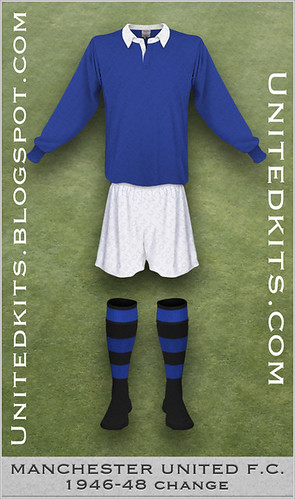

This is an edited version of an image from the extensive Leslie Millman collection, which can be found at www.flickr.com/photos/manchesterunitedman1/ and is used with full permission.

This time around, at his third attempt, Matt Busby reversed United's woeful record in the FA Cup by taking them to their first ever Wembley final against a Stanley Matthews inspired Blackpool. United wore brand new kits - royal blue shirts and socks and white shorts. The shirts differed from the regular change shirts in that the plackets were the blue instead of white. It was also adorned with an embroidered crest of the Manchester coat of arms, another first for a United kit. Photographs of these shirts clearly show that they were produced by Umbro.
The match was a classic, with United twice falling behind in the first half only to score three in the last twenty minutes to win 4-2 and claim their first cup since 1909.
Captain Johnny Carey lifts the cup:
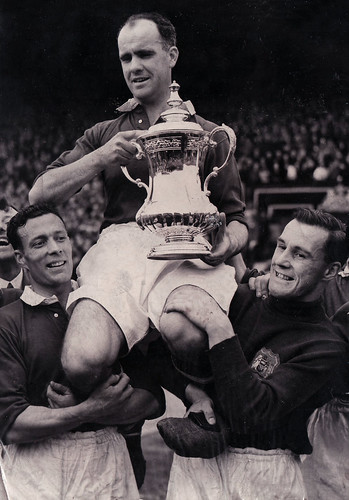
This is an edited version of an image from the extensive Leslie Millman collection, which can be found at www.flickr.com/photos/manchesterunitedman1/ and is used with full permission.

This is an edited version of an image from the extensive Leslie Millman collection, which can be found at www.flickr.com/photos/manchesterunitedman1/ and is used with full permission.
Upon their return from the capital, the players embarked on an open-topped bus ride through the streets of Manchester. Their first destination was the home of Chairman James Gibson who had missed the final due after suffering a stroke. When presented with the trophy, the ailing Gibson must surely have been assured United's era of success under Busby was well underway and that his own faith and investment in the club had at last been rewarded.
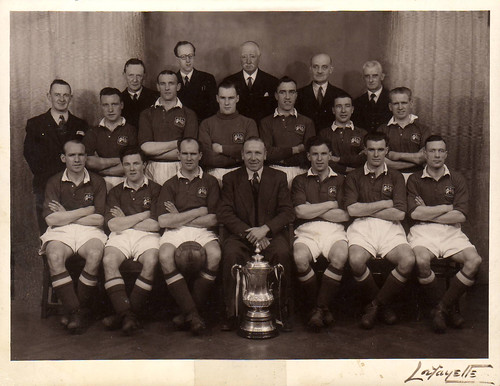
This is an edited version of an image from the extensive Leslie Millman collection, which can be found at www.flickr.com/photos/manchesterunitedman1/ and is used with full permission.

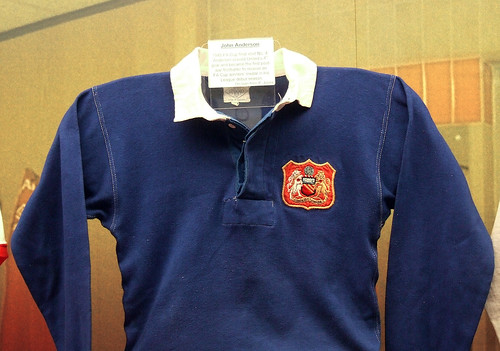


No comments:
Post a Comment